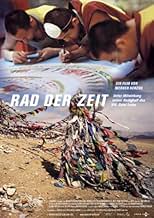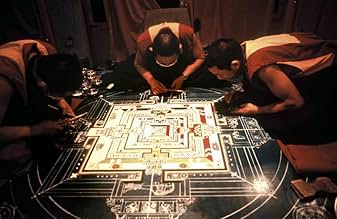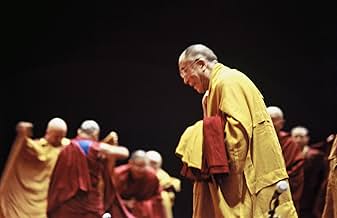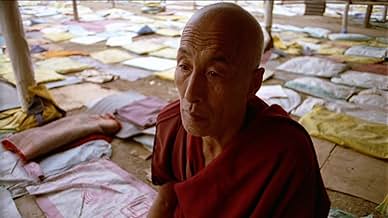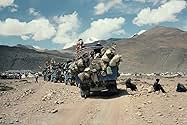IMDb RATING
7.1/10
2.9K
YOUR RATING
Wheel of Time is Werner Herzog's photographed look at the largest Buddhist ritual in Bodh Gaya, India.Wheel of Time is Werner Herzog's photographed look at the largest Buddhist ritual in Bodh Gaya, India.Wheel of Time is Werner Herzog's photographed look at the largest Buddhist ritual in Bodh Gaya, India.
- Director
- Writer
- All cast & crew
- Production, box office & more at IMDbPro
7.12.8K
1
2
3
4
5
6
7
8
9
10
Featured reviews
More anthropological than spiritual.
This film is an exploration of several Tibetan Buddhist rituals, and centers around an initiation in India attended by hundreds of thousands of Himalayan devotees, many of whom arrive after punishing pilgrimages that, in one case, took up to three and a half years. As Cinema this film excels. Herzog places himself in the midst of the throng. The faces he captures tell a thousand stories. Yet the actual stories are few and far between. There is a cool detachment in this film that gives it an anthropological feel. Herzog admitted in a live discussion after the screening that he had little familiarization with Buddhism, and reluctantly took this assignment after several requests only after the Dalai Lama himself personally asked him to do it. There is little to be learned here about the ritual itself, as the film focuses mostly on the attendees. Herzog seems uninterested in the meaning behind the sometimes strange-seeming actions of the devoted monks, and focuses instead on observation. While this is a smart approach for a film-maker on one hand, since any attempt to explain this complicated philosophical system would undoubtably fall short, I was left wanting more. If I can make a somewhat strange metaphor: it was like seeing a documentary on the Superbowl, which focused on Americans traveling from all over the country, standing in long lines, paying large sums of money to get in, drinking beer, shouting and cheering at the field, or shouting at television screens, waving strange banners around, and possibly braving rain, snow or blizzard to see it--without ever really going into what football is. Long shots of haggard faces and people doing "the wave" would be compelling to watch, but wouldn't give a true picture of the event. If you're interested in seeing a fly-on-the-wall observation of a very interesting and different aspect of the human experience, this film succeeds. But if you are interested in understanding the Kalachakra ritual, or learning more about Buddhism, then, like me, you'll be left unsatisfied. Perhaps the film is mistitled. The title, "Wheel of Time", somehow promised something different to me. A more apt title would be something like, "Naked Devotion".
Perfecting humanity
In 2002 Werner Herzog went to India to observe the festival of Kalachakra, the ritual that takes place every few years to allow Tibetan Buddhist monks to become ordained. An estimated 500,000 Buddhists attended the initiation at Bodh Gaya, the land where the Buddha is believed to have gained enlightenment. The resulting documentary, Wheel of Time, is not a typical Herzog film about manic eccentrics at odds with nature but an often sublime look at an endangered culture whose very way of life is threatened. Herzog admits that he knows little about Buddhism and we do not learn very much about it in the film, yet as we observe the rituals, the celebrations, and the devotion of Tibetan Buddhists we learn much about the richness of their tradition and their strength as a people.
The festival, which lasts ten days, arose out of the desire to create a strong positive bond for inner peace among a large number of people. One notices the almost complete absence of women yet the film ignores it and the narrator makes no comment. The monks begin with chants, music, and mantra recitation to bless the site so that it will be conducive for creating the sand mandala. The magnificently beautiful mandala, which signifies the wheel of time, is carefully constructed at the start of the festival using fourteen different tints of colored sand, then dismantled at the end to dramatize the impermanence of all things. Once built, it is kept in a glass case for the duration of the proceedings so that it will not be disturbed. The most striking aspect of the film are the scenes showing the devotion of the participants.
Using two interpreters, Herzog interviews a monk who took three and one-half years to reach the festival while doing prostrations on the 3000-mile journey. The prostrations, which are similar to bowing and touching the ground, serve as a reminder that we cannot reach enlightenment without first dispelling arrogance and the affliction of pride. In this case, the monk has developed lesions on his hand and a wound on his forehead from touching the earth so many times, yet it hasn't dampened his spirit. Other Buddhists are shown trying to do 100,000 prostrations in six weeks in front of the tree under which the Buddha is supposed to have sat. Herzog introduces a moment of humor when he films a young child imitating the adults by doing his own prostrations but not quite getting the hang of it. In a sequence of rare beauty accompanied by transcendent Tibetan music, we see a Buddhist pilgrimage to worship at the foot of 22,000-foot Mount Kailash, a mountain that is considered in Buddhist and Hindu tradition to be the center of the universe.
The Dalai Lama explains wryly, however, that in reality each of us is truly the center of the universe. After waiting in long lines to witness the Dalai Lama conduct the main ceremony, the crowd is shocked into silence when he tells them that he is too ill to conduct the initiation and will have to wait until the next Kalachakra meeting in Graz, Austria in October. The Graz initiation ceremony is much smaller, however, being confined to a convention hall that can only fit 8000 people; however, everyone is grateful to see the Dalai Lama restored to health. In Austria, Herzog interviews a Tibetan monk who has just been released from a Chinese prison after serving a sentence of thirty-seven years for campaigning for a "Free Tibet". His ecstasy in greeting the Dalai Lama is ineffable. During the closing ceremony, the monks dismantle the Mandala, sweeping up the colored sands and the Dalai Lama releases the mixed sand to the river as a means of extending blessings to the world for peace and healing.
Herzog's mellifluous voice lends a measure of serenity to the proceedings and he seems to be a sympathetic observer. While he makes every effort not to be intrusive, he cannot resist staging a scene toward the end of the film in which a bodyguard is seen presiding over an almost empty convention hall to illustrate the Buddhist concept of emptiness. Wheel of Time may not be Herzog's best work but it does contain moments of grace and images of spectacular beauty. Because of the destruction of their heritage, the Tibetans survive today mainly in the refugee camps of India. Any effort that promotes an understanding of their culture is very welcome and Wheel of Time provides us with an insight into an ancient tradition geared toward perfecting humanity through quieting the mind and cultivating compassion.
The festival, which lasts ten days, arose out of the desire to create a strong positive bond for inner peace among a large number of people. One notices the almost complete absence of women yet the film ignores it and the narrator makes no comment. The monks begin with chants, music, and mantra recitation to bless the site so that it will be conducive for creating the sand mandala. The magnificently beautiful mandala, which signifies the wheel of time, is carefully constructed at the start of the festival using fourteen different tints of colored sand, then dismantled at the end to dramatize the impermanence of all things. Once built, it is kept in a glass case for the duration of the proceedings so that it will not be disturbed. The most striking aspect of the film are the scenes showing the devotion of the participants.
Using two interpreters, Herzog interviews a monk who took three and one-half years to reach the festival while doing prostrations on the 3000-mile journey. The prostrations, which are similar to bowing and touching the ground, serve as a reminder that we cannot reach enlightenment without first dispelling arrogance and the affliction of pride. In this case, the monk has developed lesions on his hand and a wound on his forehead from touching the earth so many times, yet it hasn't dampened his spirit. Other Buddhists are shown trying to do 100,000 prostrations in six weeks in front of the tree under which the Buddha is supposed to have sat. Herzog introduces a moment of humor when he films a young child imitating the adults by doing his own prostrations but not quite getting the hang of it. In a sequence of rare beauty accompanied by transcendent Tibetan music, we see a Buddhist pilgrimage to worship at the foot of 22,000-foot Mount Kailash, a mountain that is considered in Buddhist and Hindu tradition to be the center of the universe.
The Dalai Lama explains wryly, however, that in reality each of us is truly the center of the universe. After waiting in long lines to witness the Dalai Lama conduct the main ceremony, the crowd is shocked into silence when he tells them that he is too ill to conduct the initiation and will have to wait until the next Kalachakra meeting in Graz, Austria in October. The Graz initiation ceremony is much smaller, however, being confined to a convention hall that can only fit 8000 people; however, everyone is grateful to see the Dalai Lama restored to health. In Austria, Herzog interviews a Tibetan monk who has just been released from a Chinese prison after serving a sentence of thirty-seven years for campaigning for a "Free Tibet". His ecstasy in greeting the Dalai Lama is ineffable. During the closing ceremony, the monks dismantle the Mandala, sweeping up the colored sands and the Dalai Lama releases the mixed sand to the river as a means of extending blessings to the world for peace and healing.
Herzog's mellifluous voice lends a measure of serenity to the proceedings and he seems to be a sympathetic observer. While he makes every effort not to be intrusive, he cannot resist staging a scene toward the end of the film in which a bodyguard is seen presiding over an almost empty convention hall to illustrate the Buddhist concept of emptiness. Wheel of Time may not be Herzog's best work but it does contain moments of grace and images of spectacular beauty. Because of the destruction of their heritage, the Tibetans survive today mainly in the refugee camps of India. Any effort that promotes an understanding of their culture is very welcome and Wheel of Time provides us with an insight into an ancient tradition geared toward perfecting humanity through quieting the mind and cultivating compassion.
The unexpected calmness of Werner Herzog
`Wheel of Time' is a very good film, but I admit that it is different from what I expected from Herzog. He is still very talented, but I doubt if the subject matter is best suited to him. `Wheel of Time' concerns many things, including religion, virtue, and faith, which in this case may not be the best subjects for Herzog. But when `Wheel of Time' deals with some strange and crazy rituals, political oppression, and rugged landscapes, these parts of the film are very satisfying.
Some scenes in `Wheel of Time' are magical, especially the scenes which show vast landscapes and people performing strange rituals. Those scenes are Herzogian, I think. Nobody does this kind of thing better than Herzog. If a cinephile watches these scenes, not knowing who shot them, he or she will guess correctly that they were shot by Herzog. These scenes make `Wheel of Time' rise way above television documentaries.
But other scenes are not as magical as I expect from Herzog's films. I think that maybe the religious subject matter of this film doesn't allow Herzog to be as playful in directing as he was in other films. It is very difficult for any filmmaker, including Herzog, to make an interesting documentary about something virtuous like this. It would be much easier to make an interesting film if the film is about `good vs. evil', or about some strange rituals in which people walk on fire and pierce themselves horrifically.
I think Herzog is like a wizard, and one can hardly makes a more magical film than him if the film is about nature-made or man-made madness, brutality, or suffering in life. But because of the subject matter of `Wheel of Time', this film is not my most favorite of Herzog's. I like `Wheel of Time' as much as Herzog's `How Much Wood Would a Woodchuck Chuck' (1976) and `The Flying Doctors of East Africa' (1969). I think these three films are very good films, but because the people portrayed in these films are not `very' strange nor `very' crazy, these three films lack some kind of excitement I found in other films by Herzog, especially when compared to Herzog's `Gesualdo: Death for Five Voices' (1995), `My Best Fiend' (1999), `The Great Ecstasy of Woodcarver Steiner' (1974), and `Land of Silence and Darkness' (1971), which is my most favorite of Herzog's films.
Some parts of Herzog's `Lessons of Darkness' (1992) deal with political madness, and I think Herzog is good at this subject, too. In one scene in `Wheel of Time', a former political prisoner gave an interview about the brutality of the Chinese rule. This scene is very simple. It is just a normal interview. But for me the power of this scene is much more stronger than most scenes in `Wheel of Time'. And it also reminds me of some great scenes in `Lessons of Darkness' in which some people gave their own testimonies to what happened when Saddam invaded Kuwait. I think one thing that makes the scene about the former prisoner stand apart from other scenes in `Wheel of Time' is because this scene talks about `evil forces', while other scenes in `Wheel of Time' are about some kind of virtuous power.
Some scenes in `Wheel of Time' are magical, especially the scenes which show vast landscapes and people performing strange rituals. Those scenes are Herzogian, I think. Nobody does this kind of thing better than Herzog. If a cinephile watches these scenes, not knowing who shot them, he or she will guess correctly that they were shot by Herzog. These scenes make `Wheel of Time' rise way above television documentaries.
But other scenes are not as magical as I expect from Herzog's films. I think that maybe the religious subject matter of this film doesn't allow Herzog to be as playful in directing as he was in other films. It is very difficult for any filmmaker, including Herzog, to make an interesting documentary about something virtuous like this. It would be much easier to make an interesting film if the film is about `good vs. evil', or about some strange rituals in which people walk on fire and pierce themselves horrifically.
I think Herzog is like a wizard, and one can hardly makes a more magical film than him if the film is about nature-made or man-made madness, brutality, or suffering in life. But because of the subject matter of `Wheel of Time', this film is not my most favorite of Herzog's. I like `Wheel of Time' as much as Herzog's `How Much Wood Would a Woodchuck Chuck' (1976) and `The Flying Doctors of East Africa' (1969). I think these three films are very good films, but because the people portrayed in these films are not `very' strange nor `very' crazy, these three films lack some kind of excitement I found in other films by Herzog, especially when compared to Herzog's `Gesualdo: Death for Five Voices' (1995), `My Best Fiend' (1999), `The Great Ecstasy of Woodcarver Steiner' (1974), and `Land of Silence and Darkness' (1971), which is my most favorite of Herzog's films.
Some parts of Herzog's `Lessons of Darkness' (1992) deal with political madness, and I think Herzog is good at this subject, too. In one scene in `Wheel of Time', a former political prisoner gave an interview about the brutality of the Chinese rule. This scene is very simple. It is just a normal interview. But for me the power of this scene is much more stronger than most scenes in `Wheel of Time'. And it also reminds me of some great scenes in `Lessons of Darkness' in which some people gave their own testimonies to what happened when Saddam invaded Kuwait. I think one thing that makes the scene about the former prisoner stand apart from other scenes in `Wheel of Time' is because this scene talks about `evil forces', while other scenes in `Wheel of Time' are about some kind of virtuous power.
One of the great documentaries on the subject of religion.
Werner Herzog's documentaries aren't like the documentaries of anyone else. Perhaps the best documentaries are unique to the people who make them. You can tell a Flaherty from a Wiseman just as you can tell a Maysles Brothers from a Herzog. Werner is interested in extremes, if only the extremes in subject matter. He will go out of his way to show us places and things other film-makers often ignore. "Wheel of Time" is his film about a place and an event not usually seen here in the West.
Its subject is a Buddhist initiation rite performed by His Holiness the Dalai Lama and attended by over half a million pilgrims. It's a ceremony of such complexity that Herzog's capturing of it is something of a miracle in itself and, of course, it is a thing of consumate beauty. This is what religion should be but very seldom is and Herzog is a masterful observer. He also narrates the film, informing us about what is happening when we need to know but most of the time simply showing us events as they unfold. Wonderful cinema and one of Herzog's best films.
Its subject is a Buddhist initiation rite performed by His Holiness the Dalai Lama and attended by over half a million pilgrims. It's a ceremony of such complexity that Herzog's capturing of it is something of a miracle in itself and, of course, it is a thing of consumate beauty. This is what religion should be but very seldom is and Herzog is a masterful observer. He also narrates the film, informing us about what is happening when we need to know but most of the time simply showing us events as they unfold. Wonderful cinema and one of Herzog's best films.
Herzog showing a culture, in mass, in inner-peace, led by the guy to know most
Wheel of Time is a curious documentary crucially because of someone from the West, like myself, being privy to traditional customs and ceremonial practices that seem like they could be coming from another world. But, as one soon learns, this curiosity is strong because it IS apart of this world, and maybe the truest moment of clarity from the Dalai Lama himself comes when he states how the universe is really not owned by one country or apart of one mountain or other, but is in how an individual conceives it- the universe, the center of it, is in you, or at least your projection of what it is, which is not something collective but ultimately is. It's a very wise statement that will keep me pondering it over for a long time. Likewise, the Kalachakra mandala becomes like a metaphor for this ideal, of hundreds of thousands of people coming together for the purpose of- aside from getting priceless words from the Dalai Lama- being at inner peace with oneself, hence the universe.
By the end of Wheel of Time I didn't know much more about Buddhism than I had going into it, which isn't any real fault on Herzog's end as a filmmaker; it doesn't illuminate and challenge the mind too much like other documentaries of the filmmaker, but it's also nevertheless unique in Herzog's cannon for what he does and doesn't take on with his subject(s). On the one hand, he's endlessly fascinated with ritual, with physical movements, of the masses of people who have gone on this pilgrimage from thousands of miles from all over the continent for this once-in-two-years event (this adds a dosage of climactic irony for what happens there- an 'illness'). It's anthropological to an extent, only it's not one of everyday culture so much as the unheeding devotion to a religion based around enlightenment, not suffering via a messiah or other. On the other hand, Herzog relies this time on just being a guy with a camera, moving around these swarms of people, and this time Herzog relents for the most part to "directing landscapes" as he usually does to just catching people's faces, their body language, and the instruments at their disposal (which are, usually, their own bodies, as in their bowing-type moves to attain a level, and crawling on ones hands and face across land for a purpose). It's actually, for Herzog, kind of conventional, bordering on being something one might expect for television.
But this little note shouldn't discourage one from seeing the film, and whether you're a Buddhist or not it holds its own aura that provides moments almost akin to what the Dalai Lama wants for his pupils and followers. One's even reminded of Woodstock in comparison of a documentary that goes out of its way to show more-so the nature of the people who gather together, and the power of a gathering, than the actual acts themselves. On top of this, Herzog does the occasional focus on an individual (albeit a little sidetracked as it is during the climax) with a political prisoner released from China and allowed to finally "see" the Dalai Lama in person. And for Herzog fans who are always on the prowl for his 'adequate images', there's still a good few to go around here, like when he captures the mountains that the Tibetans go to in masses, or the final images, including one that is as haunting as anything Herzog's shot. It's a peaceful, brisk journey; not a great work, but not an insignificant one either.
By the end of Wheel of Time I didn't know much more about Buddhism than I had going into it, which isn't any real fault on Herzog's end as a filmmaker; it doesn't illuminate and challenge the mind too much like other documentaries of the filmmaker, but it's also nevertheless unique in Herzog's cannon for what he does and doesn't take on with his subject(s). On the one hand, he's endlessly fascinated with ritual, with physical movements, of the masses of people who have gone on this pilgrimage from thousands of miles from all over the continent for this once-in-two-years event (this adds a dosage of climactic irony for what happens there- an 'illness'). It's anthropological to an extent, only it's not one of everyday culture so much as the unheeding devotion to a religion based around enlightenment, not suffering via a messiah or other. On the other hand, Herzog relies this time on just being a guy with a camera, moving around these swarms of people, and this time Herzog relents for the most part to "directing landscapes" as he usually does to just catching people's faces, their body language, and the instruments at their disposal (which are, usually, their own bodies, as in their bowing-type moves to attain a level, and crawling on ones hands and face across land for a purpose). It's actually, for Herzog, kind of conventional, bordering on being something one might expect for television.
But this little note shouldn't discourage one from seeing the film, and whether you're a Buddhist or not it holds its own aura that provides moments almost akin to what the Dalai Lama wants for his pupils and followers. One's even reminded of Woodstock in comparison of a documentary that goes out of its way to show more-so the nature of the people who gather together, and the power of a gathering, than the actual acts themselves. On top of this, Herzog does the occasional focus on an individual (albeit a little sidetracked as it is during the climax) with a political prisoner released from China and allowed to finally "see" the Dalai Lama in person. And for Herzog fans who are always on the prowl for his 'adequate images', there's still a good few to go around here, like when he captures the mountains that the Tibetans go to in masses, or the final images, including one that is as haunting as anything Herzog's shot. It's a peaceful, brisk journey; not a great work, but not an insignificant one either.
Did you know
- Quotes
The Dalai Lama: All religions carry same message. Message of love, compassion, forgiveness, tolerance, contentment, self-discipline. I think we need these qualities, irrespective of whether we are believer or non-believer, because these are the source of a happy life.
- SoundtracksHimal
Performed by Prem Rama Autari
- How long is Wheel of Time?Powered by Alexa
Details
Contribute to this page
Suggest an edit or add missing content

